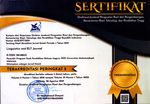THE EFFECTIVENESS OF USING WORD MAPPING TECHNIQUE TO INCREASE STUDENT VOCABULARY
Abstract
This study aims to investigate about the Effectiveness of Using Word Mapping Technique in Teaching Students Vocabulary at The First Grade Students of SMAN 8 Mataram in Academic Year 2014/2015. There were 79 students as sample. This study used quasi experimental non-equivalent research design. The data analysis showed the mean score of experimental group is higher than the mean score of control group. the use of word mapping technique is effective in teaching vocabulary. The deviation of the two mean scores (26.78/17.2) was also significant. It read that the value of t-test was 4.35 while the value of t-table was 2.000 on the level of significant 0.05 (95%) and 2.660 on the level significant 0.01 (99%). This figure indicated that the value of t-calculated was higher than t-value of t- table 4.35 > 2.000 and 2.660. The data indicated that t-test was higher than t-table, it means that the alternative hypothesis (H3) is accepted. Word maps technique maintain the students learning about words through mapping because helps them examine the characteristics of the word concepts, categorize words, and see relationships among words that are similar as well as those that may be different.
Keywords
Full Text:
PDFReferences
Arikunto, Suharsimi. 2013. Manajemen Penelitian. Jakarta: Rineka Cipta.
Cameron, Lynne. 2001. Teaching Language to Young Learners. New York:Cambridge University Press.
Finocchiaro, M. 1974. The Foreign Language Learner. New York: Regent Publishing Company.
Long, Lynette. 2005. Wacky Word Problems. Canada: John Wiley & Sons.
Hornby, A.S. 1995. Oxford Advanced Learners’ Dictionary. New York: Oxford University Press.
Morehead, Phillip D. 2001. The New American Webster Handy College Dictionary Fourth Edition. New York: New American Library.
Nafrina, Ajeng. 2007. A Thesis: The Teacher and Learner Talk in the Classroom Interaction of Grade VIII. SMPN Cepiring Kendal. Universitas Negeri Semarang: Unpublished.
Nugrahaningsih, Niken. 2007. A Thesis: The Use of Total Physical Response (TPR) Method in English Preposition Teaching (to the Fifth Grade Students in Academic Year 2006/ 2007 SDN Tajuk I Getasan Kab. Semarang). Universitas Negeri Semarang: Unpublished.
Nugroho, Kurniawan Yudhi. 2007. A Thesis: The Use of Circle Games as a Strategy to Improve The Students’ Mastery in English Vocabulary (An Action Research In the Case of Elementary School Students of SDN 01Banyumanik Semarang in the Academic Year 2007/ 2008). Universitas Negeri Semarang: Unpublished .
Ramelan.1992. Linguistics and Its Contribution to Language Teachers. Semarang: IKIP Semarang Press.
Subana, 2000. Statistik Pendidikan. Bandung. Pustaka Setia.
Ula, Titik Nurul. 2008. A Study On Teaching English Using Games to The Ninth Year Students Of SMPN 3 Pare-Kediri In 2007-2008. IKIP Budi Utomo Malang. Unpublished.
Tessana-Ngam, Issariya. 2004. A Dissertation: The Effect of Vocabulary Learning Strategies Training on Thai University Students’ Word Retention in the Second Language Classroom (Volume I). University of Esse: Unpublished.
Thornbury, Scott. 2002. How to Teach Vocabulary. Edinburg: Pearson Education
limited.
DOI: https://doi.org/10.31764/leltj.v3i1.531
Refbacks
- There are currently no refbacks.
Copyright (c) 2018 Linguistics and English Language Teaching Journal

This work is licensed under a Creative Commons Attribution-ShareAlike 4.0 International License.
_____________________________________________________
Linguistics and ELT Journal
p-ISSN 2339-2940 | e-ISSN 2614-8633

LELTJ is licensed under a Creative Commons Attribution-ShareAlike 4.0 International License.
_____________________________________________________
LELTJ is abstracting & indexing in the following databases:
_____________________________________________________
LELTJ Editorial Office:













